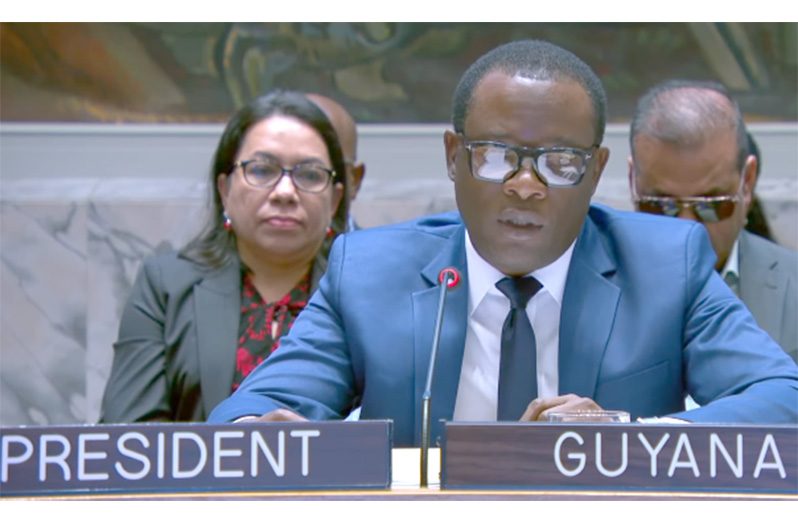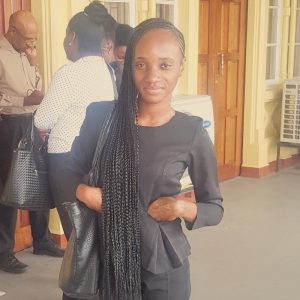SPEAKING at the United Nations Security Council (UNSC) on Thursday, June 19, 2025, Guyana’s Minister of Foreign Affairs and International Co-operation, Hugh Todd delivered a powerful address linking poverty and underdevelopment to global instability and conflict.
The minister was at the time leading an open debate convened by Guyana, which currently holds the rotating presidency of the Security Council.
The discussion was titled, “Poverty, Underdevelopment and Conflict: Implications for the Maintenance of International Peace and Security”.
“We meet today amidst immense challenges to international peace and security,” Minister Todd told the Council. “This is manifested in the unprecedented number of conflicts and growing tensions in many parts of the world where peace is becoming increasingly fragile.”
He stressed that as challenges evolve, so, too, must global responses, emphasising the need to examine root causes. “Guyana has chosen to focus today’s debate on poverty and underdevelopment, and their implications for the maintenance of international peace and security,” he said.
Minister Todd expressed gratitude to UN Secretary-General António Guterres, Assistant Secretary-General Kanni Wignaraja of the UNDP, and H.E. Mahmoud Ali Youssouf, Chairperson of the African Union Commission, for their insights on the topic.
Central to his address was the argument that peace cannot be achieved or sustained without addressing economic inequalities. “Peace and security cannot be divorced from development,” Todd stated. “Poverty and underdevelopment are common features across many of the situations of which the Security Council is seized. As a matter of course, the Council must also apply a development lens in carrying out its mandate.”
Citing a 1992 Security Council Presidential Statement, he reminded the Council of its own words: “Peace and prosperity are indivisible, and lasting peace and stability will require effective international cooperation for the eradication of poverty and the promotion of a better life for all in larger freedom.” He added, “This remains relevant today — perhaps even more so.”
Warning of slow progress towards the 2030 Sustainable Development Goals (SDGs), Todd noted that 83 per cent of the SDG targets are projected to be unmet, with 1.1 billion people still living in multidimensional poverty. He added that nearly half a billion of these individuals reside in countries affected by violent conflict, according to the United Nations Development Programme (UNDP).
He stressed that prioritising political solutions alone is insufficient. “It is equally critical to create conditions for socio-economic stability and well-being,” Todd said. “We must therefore address, inter alia, lack of economic opportunities, lack of access to education, unemployment and exclusion.”
Moreover, Minister Todd stated, “the 2025 World Social Report has warned that an escalation of ongoing conflicts—or the emergence of new ones—would lead to further setbacks in our global efforts to eradicate poverty and address underdevelopment. The world, therefore, stands at a critical juncture, where the interlinkages between peace, security, and development have never been more pronounced. This moment calls for collective and decisive action. In this context, I wish to proffer the following points for the Council’s consideration.”
In his appeal, Todd also highlighted the need to strengthen national institutions and renew efforts to reform global financial systems. “There is truth in the saying that being poor is expensive, since developing countries expend more to access finance,” he said.
“The global financial architecture should be more responsive to the needs of developing countries as a whole, particularly those transitioning out of conflict. This is critical for derisking and resilience building.”
He referenced an IMF finding that for every US$1 spent on conflict prevention in post-violence countries, up to US$103 in costs can be saved. “Sound macroeconomic policies and international support for these policies can play key roles in conflict prevention. This should be an element in the Council’s early recovery efforts,” Todd said.
The minister also called for greater inclusion of women and youth in peace and security frameworks. “Currently, the global youth population is the highest in history, with most young people concentrated in developing countries,” he observed.
“To harness their full potential, they must be given adequate economic opportunities and be involved in decision-making on peace and security.”
Highlighting a 2023 UNDP report, Todd noted that economic motivation—not ideology—was the primary reason young people joined and later left extremist groups. “
“I also underscore that concerted and determined action that addresses the root causes of conflicts requires a comprehensive approach to women’s involvement in peace and security issues, as this Council has long recognised,” Minister Todd added.
Concluding his statement, Minister Todd reflected on the 80th Anniversary of the United Nations. “We must reaffirm equally the three pillars on which the organisation is built and recognise the interconnection between those pillars,” he urged.
In the context of the ongoing discussions on UN reform tied to the UN80 observance, Todd cautioned that “we should ensure that any recalibration does not result in reducing the UN’s role in global development, peace and security, and human rights.”
“The Security Council cannot operate in silos.”



.jpg)









